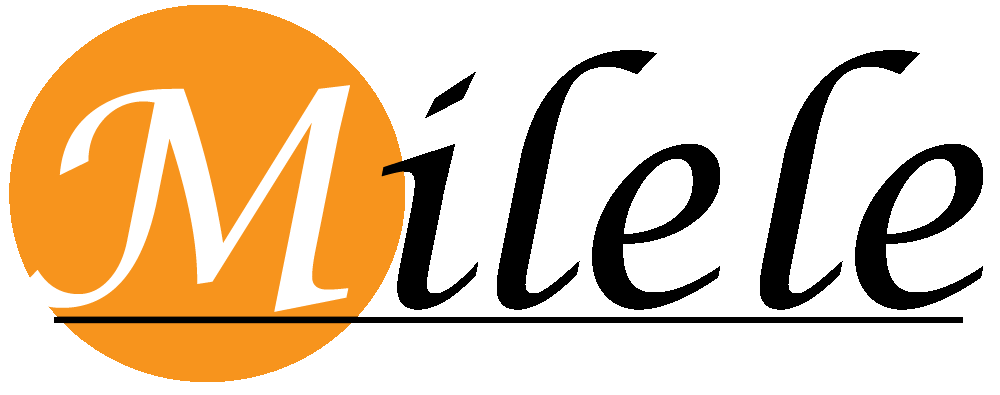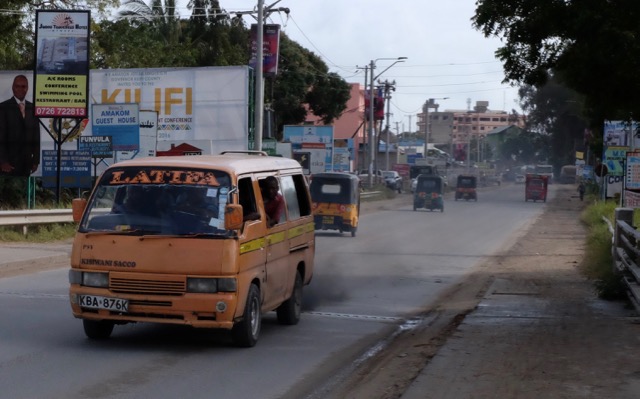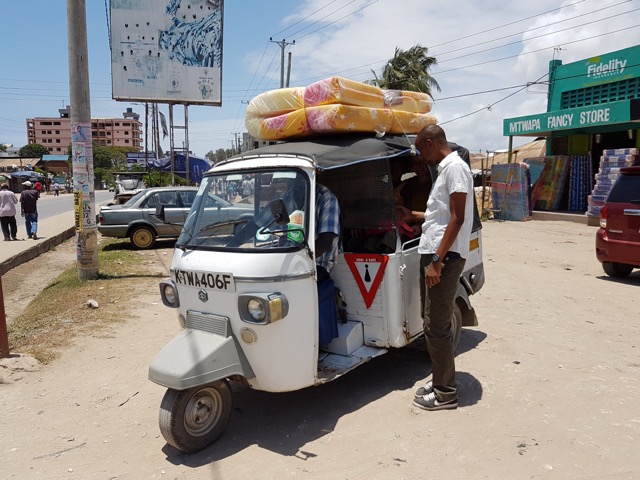Travelling Around Mtwapa
Hi All, Amy and I have been visiting Mtwapa for almost 10 years now and that got me thinking about some of the things which now seem completely normal but were the most surprising / exciting things when we first arrived. For me, I think that transport is one of those areas.
The vast majority of Mtwapa's residents do not own their own car but instead use the vast array of public transport options which cater for both short hops and long journeys. In this article I'll talk about a few of the most popular options which are part of daily life for our kids and their families.
Matatus
Probably the most common and useful form of transport in Mtwapa is the Matatu. A Matatu is a small public bus which officially holds 13 passengers although if the traffic police aren't looking the number has been known to rise (on a particularly busy day we had 32 people on the bus).
I remember the overwhelming sense of trepidation I felt the first time I boarded a Matatu, worrying that I would not be able to squeeze my way through the cramped and crowed bus to reach the solitary free seat at the back or that as a newbie I would end up paying way over the going rate. But with time, the whole process has become normal and I can now slide my way into a tight spot (and almost always avoid sitting on another passenger on the way) and, now that we know the standard costs (which have been raised only once in 10 years), paying is simple too.
For our kids, matatus are a way of life. For any journey that takes them out of Mtwapa it's likely a matatu will be used and there seems to be no restriction to the amount or type of luggage you can carry - over the last few years we've seen a sack of live chickens, 50% of a motorbike and chainsaws without a guard (which handily slides under the seats).
Boda Boda
Matatus are great, but they can only get you so far. There is a large main road running through Mtwapa (see the photo above) which is made of tarmac but the majority of roads running into the residential areas are rough dirt roads and many are not wide enough for cars nevermind matatus. This is where Boda Boda come in.
Boda Boda are bikes (or more commonly motorbikes) which can be flagged down almost anywhere in Mtwapa. They charge a flat fee of 50 Kenyan Shillings (about £0.40) and will take you anywhere in Mtwapa; with a little negotiation you can go further afield but it's not to be advised as a bike on the main road is very exposed to the wrangling of the matatus and lorrys.
The first few times we came to Kenya we would generally try and avoid boda boda as we could never be sure if the rider would have much experience or even own a licence. But there were times where there were very few alternative options and we had to bite the bullet. Before long we were bouncing through the winding streets of Mtwapa holding on just a little too tightly!
Although the boda boda are officially allowed to carry just one passenger it's not uncommon to see the rules be bent a little. When demand is high it's not surprising to see 3 or 4 adults crammed onto a single bike. More recently the traffic police have cracked down on over crowding but that doesn't stop the riders being ambitious with their loads and a particularly note worthy sighting was a broken motorbike strapped to the back of another motorbike - how the rider wasn't continuously pulling a wheelie I'll never know!
Over time, the number a quality of riders has increased and we now regularly hope on the back of a bike if we're tight for time or are going a particularly long way. They are generally pretty safe (on the back roads) and you can't argue with the price!
Boda Boda have a really interesting history and got their name from carrying goods across the Ugandan border (Border Border became Boda Boda). The BBC World Service made a radio show about Boda Boda earlier this year and I'd really recommend giving it a listen if you're interested.
Tuk Tuks
To anyone who has traveled through Asia or parts of Africa, the Tuk Tuk will be a familiar sight. The slightly odd 3 wheeled vehicle combined with a noisy (and often underpowered) engine which provides it's name.
Tuk Tuks are used when ever a bike cannot carry the load but the destination is not on a matatu route. Tuk Tuks are my least favourite form of transport, they lack the speed and agility of the boda boda but provide little in the way of comfort - especially when they are a little older and their suspension has seized up!
Their saving grace is capacity, they take 3 passengers (sometimes a few more) and as much load as can be piled on top of the canvas roof. We have used tuk tuks when distributing nets and food parcels and we would not have been able to do it any other way. Some ingenious people have modified tuk tuks to make them into light goods vehicles - coke cola have a fleet of these which keep fridges stocked all over Kenya!
There are obviously more types of transport (coaches, taxi and handcarts to name a few) but these are the most popular ways to transport people in and around Mtwapa and it's not an exaggeration to say that the combination can be used to get you almost anywhere in Kenya... for not very much money!
Richard



